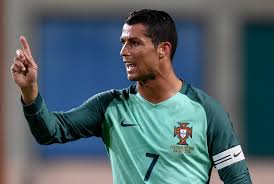By Mark Baber
June 14 – Long-standing concerns over Ronaldo’s tax affairs have come to a head as a complaint by Madrid’s public prosecutor on Tuesday accused the player of “voluntarily” and “consciously” violating his tax duties whilst the player’s representatives strenuously denied any systematic tax evasion.
Accusations that Cristiano Ronaldo has been involved in tax evasion have been swirling around since an investigation by Football Leaks, Der Spiegel and others last year, and follow similar Spanish focus on tax avoidance schemes for image rights surrounding Lionel Messi and a number of other Barcelona players.
Now the Department of Economic Crimes of the Madrid Public Prosecutor’s office has brought forward a formal complaint against the player claiming he had held back almost €15 million of taxes in the years 2011 to 2014, following an assessment of the Spanish fiscal authorities.
According to the public prosecutor, Ronaldo’s financial arrangements, which spanned companies set up in the British Virgin Islands and Ireland, were designed to hide his advertising income from financial authorities.
In response to the complaint, Ronaldo’s agency Gestifute, has issued a statement denying the player was party to any tax avoidance scheme, saying that Tollin, (the British Virgin Islands company through which he operated) was 100% owned by the player since 2004.
According to Gestifute, Tollin “was formed when the player arrived at Manchester United six years before signing with Real Madrid and their net profits were 12,753,685.28 euros, which were distributed as follows:
“EUR 1,159,472.65 in 2004
EUR 556 571.69 in 2005
EUR 1,477,602.17 in 2006
EUR 2,205,285.55 in 2007
EUR 2,769,165.02 in 2008
EUR 4,585,588.20 in 2009
“When Cristiano Ronaldo signed for Real Madrid, a special structure was not created, having kept the same one that he had in England, where he never had any problem. Contrary to what the Spanish Public Prosecutor insinuates, contractual modifications were made to ensure that the income was taxed in Spain.”
Gestifute argues that Ronaldo’s tax affairs, including those relating to image rights, were managed strictly within the parameters of the applicable laws of the time and that any discrepancies arise from very complex legal questions which in no way reflect bad faith on the part of the player and should therefore be handled through administrative rather than judicial processes.
As Gestifute argue in their statement, the gulf in estimations of Ronaldo’s tax liability between his advisers and the prosecutor’s office, appears to derive from “a different quantification of the part of the yields by transfer of image “obtained in Spain”.”
In this respect, Gestifute argue the player classified this income as income from capital, in line with Spanish law and court decisions, and quantified the amount attributable to Spain according to criterion established by the English inspectorate which were more favourable to Spain than “those derived from expert reports.”
According to Forbes, Ronaldo has been the world’s highest-paid sportsperson for the last two years, earning £72 million from salary, bonuses and endorsements last year.
Commenting on the case, tax lawyer Miles Dean, founding partner of Milestone International Tax Consultants, said: “It’s very difficult to determine whether Ronaldo has done anything untoward. He claimed the benefits of the Beckham law, which exempts non-Spanish source income for a period of 6 years – note that this concession has been removed for sportsmen from 2015. One would therefore argue that the income paid by MIM (an unrelated third party licensing company acting as a conduit that exploits the image rights) to the BVI company is outside the scope of Spanish tax. However, if MIM received Spanish source royalties, Ronaldo would be bang to rights.”
Contact the writer of this story at moc.l1743855636labto1743855636ofdlr1743855636owedi1743855636sni@r1743855636ebab.1743855636kram1743855636
|
|
